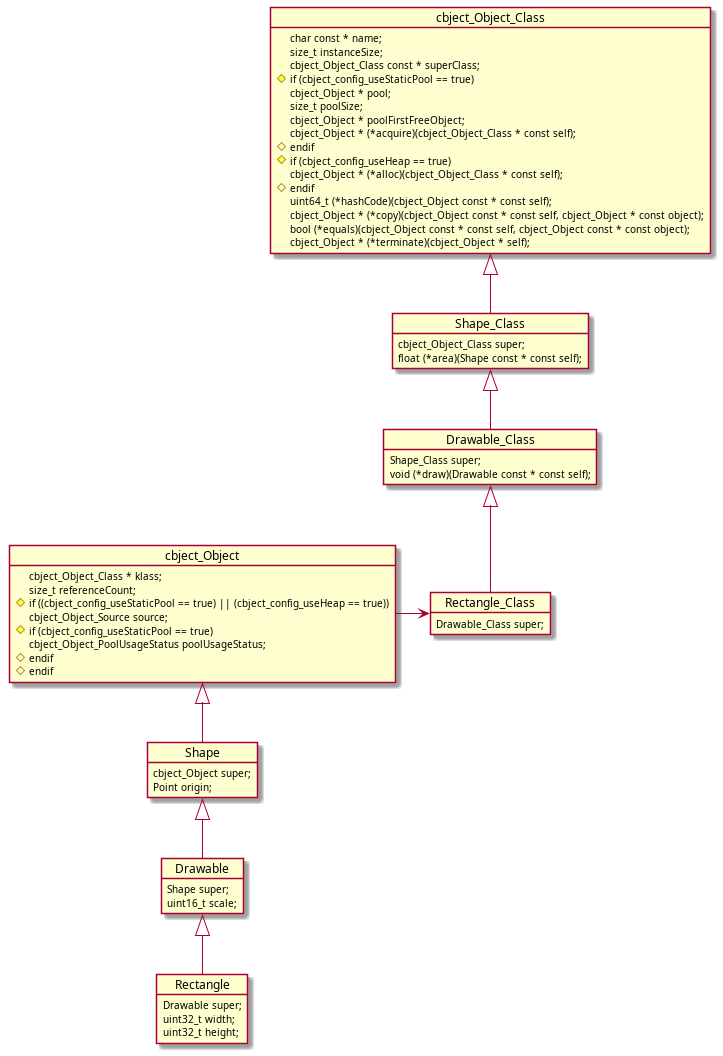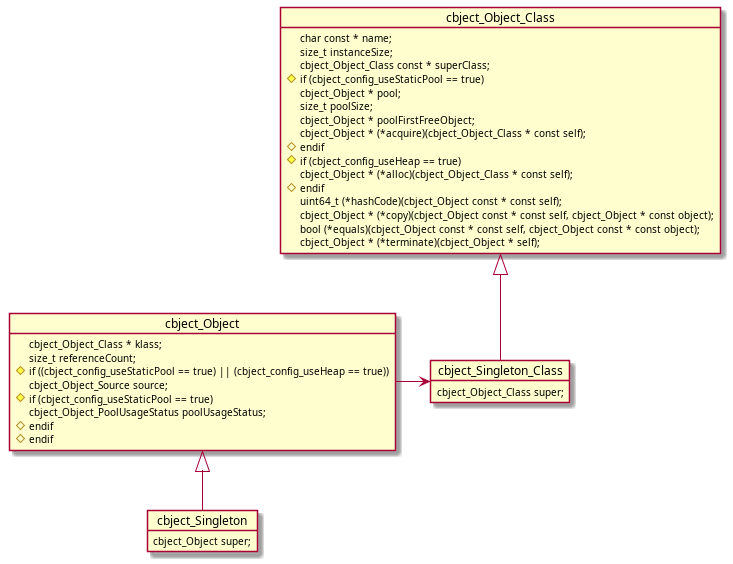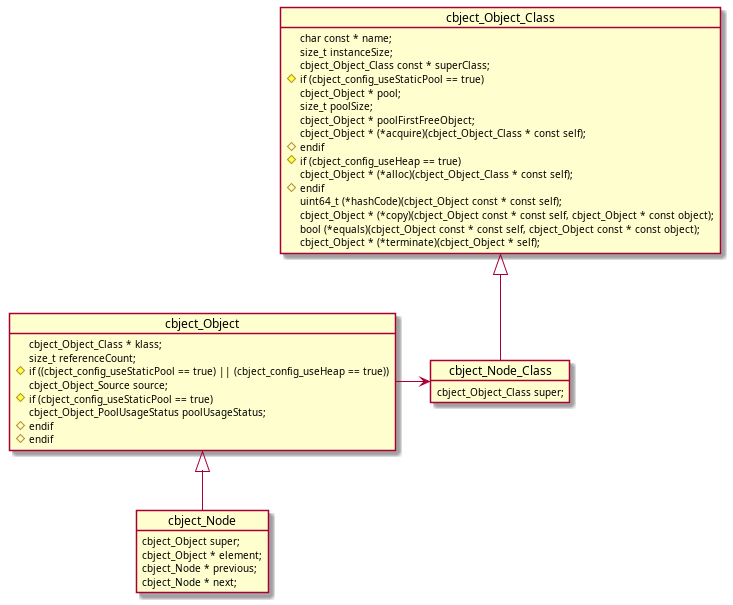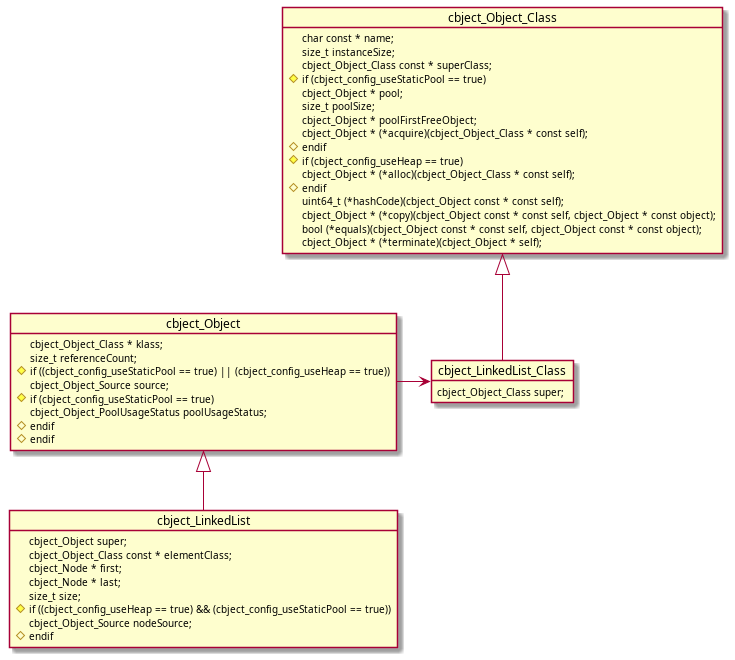1. Overview
Cbject makes it easier to write object oriented code in C.
1.1. Features
-
Objects
-
Classes
-
Inheritance
-
Polymorphism
-
Linked lists
1.2. Usage
Include the following header file:
#include "cbject.h"
cbject_Object * object = cbject_Object_init(cbject_alloc(cbject_Object)); uint64_t hashCode = cbject_hashCode(object); cbject_release(object);
#include "../cbject/cbject.h"
typedef struct Greeting Greeting;
typedef struct Greeting_Class Greeting_Class;
struct Greeting_Class {
cbject_Object_Class super;
};
Greeting * Greeting_init(Greeting * const self, char * const text);
void Greeting_print(Greeting * const self);
Greeting_Class * Greeting_Class_instance(void);
#include "Greeting.h"
#include <stdio.h>
#define cbject_Class (Greeting, cbject_Object)
struct Greeting {
cbject_Object super;
char * text;
};
cbject_noPool;
Greeting * Greeting_init(Greeting * const self, char * const text) {
cbject_init(self);
self->text = text;
return self;
}
void Greeting_print(Greeting * const self) {
printf("%s\n", self->text);
}
Greeting_Class * Greeting_Class_instance(void) {
static Greeting_Class self;
cbject_doOnce {
cbject_Class_setup(&self);
}
return &self;
}
#undef cbject_Class
// Allocate and initialize a Greeting object Greeting * greeting = Greeting_init(cbject_alloc(Greeting), "Hello Cbject!"); // Call Greeting print function on the greeting object Greeting_print(greeting); // Free memory allocated for the Greeting object cbject_release(greeting);
1.3. cbject_Object model


2. API
2.1. cbject
2.1.1. Overview
Cbject framework
2.2. cbject_config
2.2.1. Overview
Cbject configuration
2.2.2. Macros
cbject_config_useHeap
#define cbject_config_useHeap configValue
Heap config
-
true
-
false
cbject_config_useStaticPool
#define cbject_config_useStaticPool configValue
Static pool config
-
true
-
false
cbject_config_useLinkedList
#define cbject_config_useLinkedList configValue
LinkedList config
-
true
-
false
cbject_config_linkedListPoolSize
#define cbject_config_linkedListPoolSize configValue
LinkedList pool size config
-
>= 0
cbject_config_useNode
#define cbject_config_useNode configValue
Node config
-
true
-
false
cbject_config_nodePoolSize
#define cbject_config_nodePoolSize configValue
Node pool size config
-
>= 0
cbject_config_useSingleton
#define cbject_config_useSingleton configValue
Singleton config
-
true
-
false
2.3. cbject_Object
2.3.1. Overview

The building block. All objects defined in Cbject need to extend cbject_Object.
2.3.2. Types
cbject_Object
typedef struct cbject_Object cbject_Object;
Typedef for struct cbject_Object
cbject_Object_Class
typedef struct cbject_Object_Class cbject_Object_Class;
Typedef for struct cbject_Object_Class
cbject_Object_PoolUsageStatus
#if (cbject_config_useStaticPool == true)
typedef enum {
cbject_Object_PoolUsageStatus_free = 0,
cbject_Object_PoolUsageStatus_inUse
} cbject_Object_PoolUsageStatus;
#endif
Typedef and struct definition for cbject_Object_PoolUsageStatus
Used for static pool functionality
-
free
-
inUse
cbject_Object_Source
#if ((cbject_config_useStaticPool == true) || (cbject_config_useHeap == true))
typedef enum {
cbject_Object_Source_stack,
#if (cbject_config_useHeap == true)
cbject_Object_Source_heap,
#endif
#if (cbject_config_useStaticPool == true)
cbject_Object_Source_staticPool
#endif
} cbject_Object_Source;
#endif
Typedef and struct definition for cbject_Object_Source
Used if heap or static pool usage is activated
-
free
-
inUse
struct cbject_Object
struct cbject_Object {
cbject_Object_Class * klass;
size_t referenceCount;
#if ((cbject_config_useStaticPool == true) || (cbject_config_useHeap == true))
cbject_Object_Source source;
#if (cbject_config_useStaticPool == true)
cbject_Object_PoolUsageStatus poolUsageStatus;
#endif
#endif
};
Definition of struct cbject_Object
-
klass - cbject_Object_Class reference
-
referenceCount - The reference count (number of owners of the object)
-
source - Source from where the object was created (stack/heap/staticPool)
-
poolUsageStatus - Usage status of object (free/inUse)
struct cbject_Object_Class
struct cbject_Object_Class {
char const * name;
size_t instanceSize;
cbject_Object_Class const * superClass;
#if (cbject_config_useStaticPool == true)
cbject_Object * pool;
size_t poolSize;
cbject_Object * poolFirstFreeObject;
cbject_Object * (*acquire)(cbject_Object_Class * const self);
#endif
#if (cbject_config_useHeap == true)
cbject_Object * (*alloc)(cbject_Object_Class * const self);
#endif
uint64_t (*hashCode)(cbject_Object const * const self);
cbject_Object * (*copy)(cbject_Object const * const self, cbject_Object * const object);
bool (*equals)(cbject_Object const * const self, cbject_Object const * const object);
cbject_Object * (*terminate)(cbject_Object * self);
};
Definition of struct cbject_Object_Class
-
name - Name of the class
-
instanceSize - Memory size for an instance of the class
-
superClass - Super class reference
-
pool - Reference to the object static pool
-
poolSize - Size of pool (number of objects in pool)
-
poolFirstFreeObject - Reference to the first free object in the pool
-
acquire - Acquire method reference
-
alloc - Alloc method reference
-
hashCode - Hash code method reference
-
copy - Copy method reference
-
equals - Equals method reference
-
terminate - Terminate method reference
2.3.3. Functions
cbject_Object_Class_acquire()
#if (cbject_config_useStaticPool == true) cbject_Object * cbject_Object_Class_acquire(cbject_Object_Class * const self); #endif
Acquires an object from the static pool
-
self - cbject_Object_Class reference
Reference of the acquired object
cbject_Object_Class_alloc()
#if (cbject_config_useHeap == true) cbject_Object * cbject_Object_Class_alloc(cbject_Object_Class * const self); #endif
Allocates an object in heap memory
-
self - cbject_Object_Class reference
Reference of the allocated object
cbject_Object_init()
cbject_Object * cbject_Object_init(cbject_Object * const self);
Initializes an object
-
self - cbject_Object reference
Initialized object
cbject_Object_allocHelper()
cbject_Object * cbject_Object_allocHelper(
cbject_Object * const self, cbject_Object_Class * const klass,
#if ((cbject_config_useStaticPool == true) || (cbject_config_useHeap == true))
cbject_Object_Source const source
#endif
);
Sets the class of the object and other proprieties needed for allocation
-
self - cbject_Object reference
-
klass - cbject_Object_Class reference
-
source - cbject_Object_Source (optional - depends on heap and static pool config)
Reference to the object
cbject_Object_copy()
cbject_Object * cbject_Object_copy(cbject_Object const * const self, cbject_Object * const object);
Copies the object to the provided instance.
-
self - cbject_Object reference
-
object - Reference of a new object in which to copy the original one
Reference of object
cbject_Object_equals()
bool cbject_Object_equals(cbject_Object const * const self, cbject_Object const * const object);
Compares two objects
-
self - cbject_Object reference
-
object - Reference for the compared object
-
true - If the objects are equal
-
false - If the objects are different
cbject_Object_hashCode()
uint64_t cbject_Object_hashCode(cbject_Object const * const self);
Gets the hash code of the object
-
self - cbject_Object reference
The hash code of the object
cbject_Object_retain()
cbject_Object * cbject_Object_retain(cbject_Object * const self);
Increases the reference count of the object
-
self - cbject_Object reference
Reference to object
cbject_Object_release()
void * cbject_Object_release(cbject_Object * const self);
Decreases the reference count of the object and performs deallocation if reference count reaches 0
-
self - cbject_Object reference
NULL
cbject_Object_isOfClass()
bool cbject_Object_isOfClass(
cbject_Object const * const self, cbject_Object_Class const * const klass
);
Checks if an object is of a given class
-
self - cbject_Object reference
-
klass - Class reference
-
true - If the object is of the provided class
-
false - If the object is of a different class
cbject_Object_Class_instance()
cbject_Object_Class * cbject_Object_Class_instance(void);
Gets cbject_Object_Class instance
Reference of the class instance
2.3.4. Tests
test_cbject_Object_Class
Test setup of ObjectClass
-
Get ObjectClass instance
-
Check if object size stored in class is equal to the actual object size
-
Check that the function pointers in the class are initialized
test_cbject_Object_init
Test initialization of cbject_Object
-
Allocate object on stack an initialize it
-
Check if object class points to cbject_Object_Class instance
test_cbject_Object_equals
Test equals method
-
Allocate object on stack an initialize it
-
Check if equals method returns true when comparing object to self
-
Allocate another object on stack an initialize it
-
Check if equals method returns false when comparing the two objects
test_cbject_Object_hashCode
Test hashCode method
-
Allocate object on stack an initialize it
-
Check if hashCode method returns the address in memory of the object
test_cbject_Object_isOfClass
Test isOfType method
-
Define a dummy Test_Class which extends cbject_Object_Class
-
Allocate object on stack an initialize it
-
Check if isOfType method returns true when checked against cbject_Object
-
Check if isOfType method returns false when checked against Test
test_cbject_Object_copy
Test copy method
-
Allocate object on stack an initialize it
-
Allocate another object on stack and copy the first object into it
-
Check if the memory sections occupied by the two objects are equal
-
Allocate another object on heap and copy the first object into it
-
Check if the memory sections occupied by the two objects are equal
-
Deallocate the object from the heap memory
2.4. cbject_Singleton
2.4.1. Overview

2.4.2. Types
cbject_Singleton
typedef struct cbject_Singleton cbject_Singleton;
Typedef for struct cbject_Singleton
cbject_Singleton_Class
typedef struct cbject_Singleton_Class cbject_Singleton_Class;
Typedef for struct cbject_Singleton_Class
struct cbject_Singleton
struct cbject_Singleton {
cbject_Object super;
};
Definition of struct cbject_Singleton
-
super - Parent
struct cbject_Singleton_Class
struct cbject_Singleton_Class {
cbject_Object_Class super;
};
Definition of struct cbject_Singleton_Class
-
super - Parent
2.4.3. Functions
cbject_Singleton_init()
cbject_Singleton * cbject_Singleton_init(cbject_Singleton * const self);
Initializes a singleton
-
self - cbject_Singleton reference
Initialized singleton
cbject_Singleton_Class_instance()
cbject_Singleton_Class * cbject_Singleton_Class_instance(void);
Gets cbject_Singleton_Class instance
Reference of the class instance
2.5. cbject_Node
2.5.1. Overview
Node data structure used in linked lists

2.5.2. Types
cbject_Node
typedef struct cbject_Node cbject_Node;
Typedef for struct cbject_Node
cbject_Node_Class
typedef struct cbject_Node_Class cbject_Node_Class;
Typedef for struct cbject_Node_Class
struct cbject_Node
struct cbject_Node {
cbject_Object super;
cbject_Object * element;
cbject_Node * previous;
cbject_Node * next;
};
Definition of struct cbject_Node
-
super - Parent
-
element - Reference to the element
-
previous - Reference to the previous node
-
next - Reference to the next node
struct cbject_Node_Class
struct cbject_Node_Class {
cbject_Object_Class super;
};
Definition of struct cbject_Node_Class
-
super - Parent
2.5.3. Functions
cbject_Node_init()
cbject_Node * cbject_Node_init(cbject_Node * const self, cbject_Object * const object);
Initializes a Node
-
self - cbject_Node reference
-
object - Object to store in the node
Initialized Node
cbject_Node_getElement()
cbject_Object * cbject_Node_getElement(cbject_Node const * const self);
Gets the data object contained in the node
-
self - cbject_Node reference
Data object in the node
cbject_Node_getPrevious()
cbject_Node * cbject_Node_getPrevious(cbject_Node const * const self);
Gets the previous node
-
self - cbject_Node reference
The previous node
cbject_Node_setPrevious()
void cbject_Node_setPrevious(cbject_Node * const self, cbject_Node * const previousNode);
Sets the previous node
-
self - cbject_Node reference
-
previousNode - cbject_Node reference
cbject_Node_getNext()
cbject_Node * cbject_Node_getNext(cbject_Node const * const self);
Gets the next node
-
self - cbject_Node reference
The next node
cbject_Node_setNext()
void cbject_Node_setNext(cbject_Node * const self, cbject_Node * const nextNode);
Sets the next node
-
self - cbject_Node reference
-
nextNode - cbject_Node reference
cbject_Node_Class_instance()
cbject_Node_Class * cbject_Node_Class_instance(void);
Gets cbject_Node_Class instance
Reference of the class instance
2.5.4. Tests
test_cbject_Node_init
Test Node initialization
-
Create an object and a node which takes the object as input
-
Check node state
test_cbject_Node_setters
Test Node setters
-
Create 3 nodes (node, previousNode, nextNode)
-
Set previous and next nodes to the first node
-
Check the node state
2.6. cbject_LinkedList
2.6.1. Overview
Linked list data structure

2.6.2. Types
cbject_LinkedList
typedef struct cbject_LinkedList cbject_LinkedList;
Typedef for struct cbject_LinkedList
cbject_LinkedList_Class
typedef struct cbject_LinkedList_Class cbject_LinkedList_Class;
Typedef for struct cbject_LinkedList_Class
struct cbject_LinkedList
struct cbject_LinkedList {
cbject_Object super;
cbject_Object_Class const * elementClass;
cbject_Node * first;
cbject_Node * last;
size_t size;
#if ((cbject_config_useHeap == true) && (cbject_config_useStaticPool == true))
cbject_Object_Source nodeSource;
#endif
};
Definition of struct cbject_LinkedList
-
super - Parent
-
elementClass - Class of the elements stored in the list
-
first - Reference to the first node in the list
-
last - Reference to the last node in the list
-
size - Size of the list (number of elements)
-
nodeSource - Source for node creation (see cbject_Object_Source - only heap/staticPool is allowed)
struct cbject_LinkedList_Class
struct cbject_LinkedList_Class {
cbject_Object_Class super;
};
Definition of struct cbject_LinkedList_Class
-
super - Parent
2.6.3. Functions
cbject_LinkedList_init()
cbject_LinkedList * cbject_LinkedList_init(
cbject_LinkedList * const self, cbject_Object_Class const * const elementClass,
#if ((cbject_config_useHeap == true) && (cbject_config_useStaticPool == true))
cbject_Object_Source const nodeSource
#endif
);
Initializes a LinkedList
-
self - cbject_LinkedList reference
-
elementClass - Class of the elements stored in the list
-
nodeSource - Memory source for node creation (see cbject_Object_Source - only heap/staticPool is allowed)
Initialized and empty LinkedList
cbject_LinkedList_isEmpty()
bool cbject_LinkedList_isEmpty(cbject_LinkedList const * const self);
Checks if list is empty
-
self - cbject_LinkedList reference
-
true - if list is empty
-
false - if list is not empty
cbject_LinkedList_add()
void cbject_LinkedList_add(
cbject_LinkedList * const self, size_t const index, cbject_Object * const object
);
Adds an element to the end of the list
-
self - cbject_LinkedList reference
-
index - Index in the list where to add the object
-
object - Object to be added in the list
cbject_LinkedList_addLast()
void cbject_LinkedList_addLast(cbject_LinkedList * const self, cbject_Object * const object);
Adds an element to the end of the list
-
self - cbject_LinkedList reference
-
object - Object to be added in the list
cbject_LinkedList_addFirst()
void cbject_LinkedList_addFirst(cbject_LinkedList * const self, cbject_Object * const object);
Adds an element at the beginning of the list
-
self - cbject_LinkedList reference
-
object - Object to be added in the list
cbject_LinkedList_remove()
void cbject_LinkedList_remove(cbject_LinkedList * const self, size_t const index);
Removes last element in the list at provided index
-
self - cbject_LinkedList reference
-
index - Index in the list from where to remove the object
cbject_LinkedList_removeFirst()
void cbject_LinkedList_removeFirst(cbject_LinkedList * const self);
Removes first element in the list
-
self - cbject_LinkedList reference
cbject_LinkedList_removeLast()
void cbject_LinkedList_removeLast(cbject_LinkedList * const self);
Removes last element in the list
-
self - cbject_LinkedList reference
cbject_LinkedList_clear()
void cbject_LinkedList_clear(cbject_LinkedList * const self);
Removes all elements from the list
-
self - cbject_LinkedList reference
cbject_LinkedList_get()
cbject_Object * cbject_LinkedList_get(cbject_LinkedList const * const self, size_t index);
Gets element at specified index
-
self - cbject_LinkedList reference
-
index - index of the element to return
Element at specified index
cbject_LinkedList_getFirst()
cbject_Object * cbject_LinkedList_getFirst(cbject_LinkedList const * const self);
Gets the first element in the list
-
self - cbject_LinkedList reference
First element in list
cbject_LinkedList_getLast()
cbject_Object * cbject_LinkedList_getLast(cbject_LinkedList const * const self);
Gets the last element in the list
-
self - cbject_LinkedList reference
Last element in list
cbject_LinkedList_getSize()
size_t cbject_LinkedList_getSize(cbject_LinkedList const * const self);
Gets the size of the list (number of elements)
-
self - cbject_LinkedList reference
Size of list (number of elements)
cbject_LinkedList_Class_instance()
cbject_LinkedList_Class * cbject_LinkedList_Class_instance(void);
Gets cbject_LinkedList_Class instance
Reference of the class instance
2.6.4. Tests
test_cbject_LinkedList_init
Test LinkedList initialization
-
Create a linked list
-
Check class and members
-
Terminate the linked list
test_cbject_LinkedList_addFirst
Test adding elements at beginning of LinkedList
-
Define a Data_Class which extends cbject_Object_Class
-
Create a linked list and some data objects
-
Add the objects to the list and check the state of the list and the nodes
-
Terminate the linked list
test_cbject_LinkedList_addLast
Test adding elements at the end of LinkedList
-
Create a linked list and some objects
-
Add the objects to the list and check the state of the list and the nodes
-
Terminate the linked list
test_cbject_LinkedList_removeFirst
Test removing elements at the beginning of the list
-
Create a linked list and some objects
-
Add the objects to the list, remove them from the list and check the state of the list and the nodes
-
Terminate the linked list
test_cbject_LinkedList_removeLast
Test removing elements at the end of the list
-
Create a linked list and some objects
-
Add the objects to the list, remove them from the list and check the state of the list and the nodes
-
Terminate the linked list
test_cbject_LinkedList_addAndRemove
Test adding and removing elements at a certain index
-
Create a linked list and some objects
-
Add the objects to the list and check the state
-
Remove objects from the list and check the state
-
Release the linked list
test_cbject_LinkedList_clear
Test clearing elements from a list
-
Create a linked list and some objects
-
Add the objects to the list, clear the list and check the state of the list and the nodes
-
Terminate the linked list
2.7. cbject_internal
2.7.1. Overview
TODO
2.7.2. Macros
cbject_Class_setup()
cbject_Class_setup(self)
Populates the class instance
cbject_Class must be defined before using this macro
-
self - Class reference
cbject_getClass()
cbject_getClass(object)
Gets the class of an object
-
object - cbject_Object reference
Class reference
cbject_getInstanceSize()
cbject_getInstanceSize(object)
Gets the size in memory of an object
-
object - cbject_Object reference
The size in memory of the object
cbject_acquire()
cbject_acquire(type)
Acquires an object from the static pool
Calls cbject_Object_Class_acquire() and does the necessary casting
-
type - Name of class
Reference of the acquired object
cbject_alloc()
cbject_alloc(type)
Allocates an object in heap memory
Calls cbject_Object_Class_alloc() and does the necessary casting
-
type - Name of class
Reference of the allocated object
cbject_stackAlloc()
cbject_stackAlloc(type)
Allocates an object on the stack
-
type - Name of class
Reference of the allocated memory
cbject_hashCode()
cbject_hashCode(self)
Gets the hash code of the object
Calls cbject_Object_hashCode() and does the necessary casting
-
self - cbject_Object reference
The hash code of the object
cbject_equals()
cbject_equals(self, object)
Compares two objects
Calls cbject_Object_equals() and does the necessary casting
-
self - cbject_Object reference
-
object - Reference for the compared object
-
true - If the objects are equal
-
false - If the objects are different
cbject_copy()
cbject_copy(self, object)
Copies the object to the provided instance.
Calls cbject_Object_copy() and does the necessary casting
-
self - cbject_Object reference
-
object - Reference of a new object in which to copy the original one
Reference of object
cbject_retain()
cbject_retain(self)
Increases the reference count of the object
Calls cbject_Object_retain() and does the necessary casting
-
self - cbject_Object reference
Reference to object
cbject_release()
cbject_release(self)
Decreases the reference count of the object and performs deallocation if reference count reaches 0
Calls cbject_Object_release() and does the necessary casting
-
self - cbject_Object reference
NULL
cbject_allocPool()
cbject_allocPool(poolSize)
Allocates a static pool
cbject_Class must be defined before using this macro
-
poolSize - Size of pool (number of objects in pool)
cbject_noPool
cbject_noPool
Declares a null static pool
cbject_Class must be defined before using this macro Use instead of cbject_allocPool if no static pool is needed
cbject_doOnce
cbject_doOnce
Runs a block of code only once
cbject_doOnce {
functionCall();
anotherFunctionCall();
}
Not thread safe
cbject_invokeMethod()
cbject_invokeMethod(method, ...)
Polymorphic call of an object method
cbject_Class must be defined before using this macro
-
method - Name of the method
-
…
-
object - cbject_Object reference
-
… - Method params
-
Depends on the called method
cbject_invokeClassMethod()
cbject_invokeClassMethod(method, ...)
Polymorphic call of a class method
cbject_Class must be defined before using this macro
-
method - Name of the method
-
… - Method params
Depends on the called method
cbject_invokeSuperMethod()
cbject_invokeSuperMethod(type, method, ...)
Polymorphic call of a super method (object or class)
cbject_Class must be defined before using this macro
-
type - Name of the class
-
method - Name of the method
-
…
-
self - cbject_Object reference (optional - in case of object method)
-
… - Method params
-
Depends on the called method
cbject_Array_getLength()
cbject_Array_getLength(self)
Gets length of an array
-
self - Array for which to get the length
cbject_assertStatic()
cbject_assertStatic(expression, identifier)
Compile time assert
-
expression - Expression to assert
-
identifier - An identifier to describe the assertion
cbject_Token_concat()
cbject_Token_concat(self, token)
Concatenates otherToken after the provided token
-
self - Token
-
token - Token to add after the provided token
cbject_Token_concatIndirect()
cbject_Token_concatIndirect(self, token)
Concatenates otherToken after the provided token indirectly
-
self - Token
-
token - Token to add after the provided token
cbject_Token_stringify()
cbject_Token_stringify(self)
Stringifies the provided token
-
self - Token
cbject_Token_stringifyIndirect()
cbject_Token_stringifyIndirect(self)
Stringifies the provided token indirectly
-
self - Token
cbject_VaArgs_getFirst()
cbject_VaArgs_getFirst(...)
Gets first argument from VA_ARGS
-
… - VA_ARGS
cbject_VaArgs_getSecond()
cbject_VaArgs_getSecond(...)
Gets second argument from VA_ARGS
-
… - VA_ARGS
cbject_VaArgs_getRest()
cbject_VaArgs_getRest(...)
Gets list of arguments from VA_ARGS except the first
-
Comma is added before the list
-
Supports max 99 arguments
-
… - VA_ARGS
cbject_Pair_getFirst()
cbject_Pair_getFirst(self)
Gets first element from pair
-
self - (first, second)
cbject_Pair_getSecond()
cbject_Pair_getSecond(self)
Gets second element from pair
-
self - (first, second)